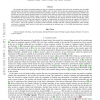Free Online Productivity Tools
i2Speak
i2Symbol
i2OCR
iTex2Img
iWeb2Print
iWeb2Shot
i2Type
iPdf2Split
iPdf2Merge
i2Bopomofo
i2Arabic
i2Style
i2Image
i2PDF
iLatex2Rtf
Sci2ools
106
click to vote
CORR
2010
Springer
2010
Springer
Probing Capacity
We consider the problem of optimal probing of states of a channel by transmitter and receiver for maximizing rate of reliable communication. The channel is discrete memoryless (DMC) with i.i.d. states. The encoder takes probing actions dependent on the message. It then uses the state information obtained from probing causally or non-causally to generate channel input symbols. The decoder may also take channel probing actions as a function of the observed channel output and use the channel state information thus acquired, along with the channel output, to estimate the message. We refer to the maximum achievable rate for reliable communication for such systems as the `Probing Capacity'. We characterize this capacity when the encoder and decoder actions are cost constrained. To motivate the problem, we begin by characterizing the trade-off between the capacity and fraction of channel states the encoder is allowed to observe, while the decoder is aware of channel states. In this sett...
Related Content
| Added | 09 Dec 2010 |
| Updated | 09 Dec 2010 |
| Type | Journal |
| Year | 2010 |
| Where | CORR |
| Authors | Himanshu Asnani, Haim H. Permuter, Tsachy Weissman |
Comments (0)

